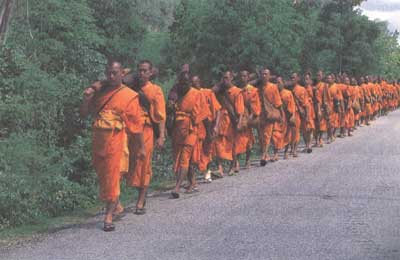สารบัญ
The Importance of Ordination
would like to begin my talk to-day by first asking you all one simple question. Ask yourself, up to the present day, what is it that you want most in Life? Alternatively, what is it that you are seeking?
I have asked this question many times before, and the answer has always been the same. We are all looking for happiness. All of us here today seek a way to true happiness.

When I ask whether anyone has found the happiness that we are all searching for, many people reply 'yes'. Nevertheless, upon closer examination, when asked to truly think about their answer, most will hesitate to say that what they have found is true happiness. This is because the happiness that many of us experience in life is only momentary. It is not true happiness. For true happiness is completely free of suffering. Moreover, although we spend our lives searching for it, we have not yet found our true happiness.
Whether we live one lifetime, or ten thousand lifetimes, without the wisdom of Lord Buddha, we will never find true happiness. There are some groups of people, who believe that worldly pleasures bring true happiness, but this is not true.
[read more click button below]
What is True happiness?
Lord Buddha blessed us with his knowledge of true happiness 2,500 years ago. He difined true happiness in to two categories.
1. Happiness that depends on material possessions: [Samisa-sukha] are things such as material possessions (like money or jewelry, or people such as husband, wife, and children), that lead one to believe that one has true happiness. This type of happiness is impermanent, and will eventually bring suffering into your life. For example,
the desire of young people who seek happiness in companionship; once they find their match they are happy, but then later on comes the suffering. Suffering in the form of concern, worry, jealousy, pride, pain, disappointment, etc... Sometimes the situation can end in divorce. This pain may one day overwhelm any of that initial joy experienced in the beginning.
2. Happiness achieved through Dhamma. [Niramisa-sukha], This is the only form of true happiness, one that is free from suffering, and the point from which the individual will eventually discover Nibbana.
Without the teaching of the Lord Buddha, the search for Niramisa-sukha; happiness free from worldly possessions, would be a difficult endeavor indeed. Even Lord Buddha, had to endure six arduous years of self-mortification before discovering Niramisa-sukha. During this period, the Buddha came close to death more than once, but when he finally found true happiness, he chose to share with us the wisdom of his experience by showing us the path to Nibbana, beginning with ordination.
"He who lives outside Dhamma {the layperson), walks on a narrow path clouded from the truth. By embracing Dhamma, one is bathed in the light of truth. He who lives by worldly possessions will find that perfection and purity will remain beyond his reach. Therefore one must shave one's head, don saffron robes, and ordain into a life free from worldly possessions."

Sometimes in life, even when we desire to live according to the precepts, there are times when we must lie. For example, a secretary whose responsibility is to arrange meetings for his/her manager must sometimes lie when the manager does not wish to meet certain individuals.
Even in professions held in high esteem, such as teachers, who are responsible for educating students and doctors who care for the health of the community - all are vulnerable to commit sins. There are many occupations where the nature of the job makes avoiding sin and bad kamma almost impossible. For example, farmers who must kill insects and livestock, military personnel, who must at times kill enemy soldiers, or sales people, who find it difficult to work without exaggerating.
The life of a layperson is a narrow one where even the opportunity strictly to observe the Five Precepts is often compromised.The chance to live a life according to the Dhamma, and find inner peace is not easy.
Even when the individual knows about the benefits of ordination.it is no small task to give up family and worldly possessions for the sake of Dhamma.The individual must have a strong inner desire, love and support from family and close friends, plus the merit accrued over previous lifetimes.
Lord Buddha told the story of his ordination to his disciples as follows. At the time he was young, his hair was dark, and he was full of youthful vitality. His parents did not want him to enter the monkhood and they despaired at his decision. Eventuallydespite their dissuasion he went ahead and shaved his head, dressed himself in monks' robes, and left his home to live a life free from worldly possessions
Motives for Ordination during the 'Time of Lord ' Buddha
During the time of Lord Buddha, men were motivated to be ordained because of the prevalence of faith in their life for the teachings of Lord Buddha, and in their desire to become an Arahant, a person who has rid his mind of all impurities. Some of these Arabants accumulated great merits over past lives. One child of only seven years of age even after listening only briefly to the teachings of Lord Buddha was immediately capable of understanding the existence of suffering in the world, and thus decided to be ordained without any hesitation. Even before the monks finished shaving his head, the boy had already become an Arahant. This 'Arahant' name was Dabbamallaputta, one whose birth in this world was fraught with difficulty.




